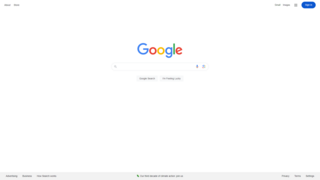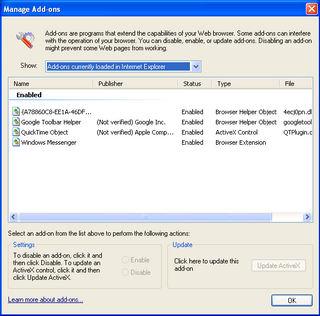Related Research Articles

Google Search is a search engine operated by Google. It allows users to search for information on the Internet by entering keywords or phrases. Google Search uses algorithms to analyze and rank websites based on their relevance to the search query. It is the most popular search engine worldwide.
Konqueror is a free and open-source web browser and file manager that provides web access and file-viewer functionality for file systems. It forms a core part of the KDE Software Compilation. Developed by volunteers, Konqueror can run on most Unix-like operating systems. The KDE community licenses and distributes Konqueror under GNU GPL-2.0-or-later.
Spyware is any software with malicious behavior that aims to gather information about a person or organization and send it to another entity in a way that harms the user by violating their privacy, endangering their device's security, or other means. This behavior may be present in malware and in legitimate software. Websites may engage in spyware behaviors like web tracking. Hardware devices may also be affected.
In the context of the World Wide Web, deep linking is the use of a hyperlink that links to a specific, generally searchable or indexed, piece of web content on a website, rather than the website's home page. The URL contains all the information needed to point to a particular item. Deep linking is different from mobile deep linking, which refers to directly linking to in-app content using a non-HTTP URI.

Alexa Internet, Inc. was an American web traffic analysis company based in San Francisco. It was a wholly-owned subsidiary of Amazon.
Google Toolbar was a web browser toolbar for Internet Explorer, developed by Google. It was first released in 2000 for Internet Explorer 5. Google Toolbar was also distributed as a Mozilla plug-in for Firefox from September 2005 to June 2011. On December 12, 2021, the software was no longer available for download, and the website now redirects to a support page.

A Browser Helper Object (BHO) is a DLL module designed as a plugin for the Microsoft Internet Explorer web browser to provide added functionality. BHOs were introduced in October 1997 with the release of version 4 of Internet Explorer. Most BHOs are loaded once by each new instance of Internet Explorer. However, in the case of Windows Explorer, a new instance is launched for each window.
This is a comparison of both historical and current web browsers based on developer, engine, platform(s), releases, license, and cost.
Mozilla Firefox has features which distinguish it from other web browsers, such as Google Chrome, Safari, and Microsoft Edge.
Flock is a discontinued web browser that specialized in providing social networking and Web 2.0 facilities built into its user interface. Earlier versions of Flock used the Gecko HTML rendering engine by Mozilla. Version 2.6.2, released on January 27, 2011, was the last version based on Mozilla Firefox. Starting with version 3, Flock was based on Chromium and so used the WebKit rendering engine. Flock was available as a free download, and supported Microsoft Windows, Mac OS X and, at one time, Linux as well.

Progressive enhancement is a strategy in web design that puts emphasis on web content first, allowing everyone to access the basic content and functionality of a web page, whilst users with additional browser features or faster Internet access receive the enhanced version instead. This strategy speeds up loading and facilitates crawling by web search engines, as text on a page is loaded immediately through the HTML source code rather than having to wait for JavaScript to initiate and load the content subsequently, meaning content ready for consumption "out of the box" is served immediately, and not behind additional layers.

Bing Maps is a web mapping service provided as a part of Microsoft's Bing suite of search engines and powered by the Bing Maps Platform framework which also support Bing Maps for Enterprise APIs and Azure Maps APIs. Since 2020, the map data is provided by TomTom, OpenStreetMap and others.

Sleipnir is a tabbed web browser developed by Fenrir Inc. The browser's main features are customization and tab functions. It supports HTML5 and multiple layout engines.
NoScript is a free and open-source extension for Firefox- and Chromium-based web browsers, written and maintained by Giorgio Maone, a software developer and member of the Mozilla Security Group.
Google Personalized Search is a personalized search feature of Google Search, introduced in 2004. All searches on Google Search are associated with a browser cookie record. When a user performs a search, the search results are not only based on the relevance of each web page to the search term, but also on which websites the user visited through previous search results. This provides a more personalized experience that can increase the relevance of the search results for the particular user. Such filtering may also have side effects, such as the creation of a filter bubble.

My Yahoo! is a start page or web portal which combines personalized Yahoo! features, content feeds and information. The site was launched in 1996 and was one of the company's most popular creations.

iGoogle was a customizable Ajax-based start page or personal web portal launched by Google in May 2005. It was discontinued on November 1, 2013, because the company believed the need for it had eroded over time.

A site-specific browser (SSB) is a software application that is dedicated to accessing pages from a single source (site) on a computer network such as the Internet or a private intranet. SSBs typically simplify the more complex functions of a web browser by excluding the menus, toolbars and browser GUI associated with functions that are external to the workings of a single site. These applications are typically started by a desktop icon which is usually a favicon.
Opera is a multi-platform web browser developed by its namesake company Opera. The current edition of the browser is based on Chromium. Opera is available on Windows, macOS, Linux, Android, and iOS. There are also mobile versions called Opera Mobile and Opera Mini. Opera users also have access to Opera News, a news app based on an AI platform.

Yandex Browser is a freeware web browser developed by the Russian technology corporation Yandex that uses the Blink web browser engine and is based on the Chromium open source project. The browser checks webpage security with the Yandex security system and checks downloaded files with Kaspersky Anti-Virus. The browser also uses Opera Software's Turbo technology to speed web browsing on slow connections.
References
- ↑ Wade Roush (January 2005). "Amazon: Giving Away the Store: Sometimes it makes sense to give away your core assets". Technology Review . Retrieved March 7, 2007.
- ↑ Screenshot of the original layout Archived 2003-07-20 at the Wayback Machine
- ↑ Amazon Light – about Archived 2003-08-12 at the Wayback Machine
- ↑ Web Awards winners Archived December 6, 2006, at the Wayback Machine – south by southwest festivals 2005.
- ↑ A Farewell to Amazon Light Archived 2010-03-25 at the Wayback Machine